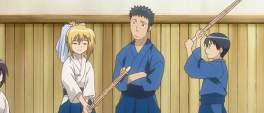Bamboo Blade seems, upon first glance, a very ambivalent series at least in its introductory episodes. It never seems to know whether to settle in as a light-hearted school drama with kendo or a straight-faced kendo drama with school fluff (or a kendo face school with light fluff drama). On the one hand is the irredeemable captain who's only current goal is to win a bet and subsequently obtain free food for a year, and on the other is a sadistic and despicable antagonist whose callous disregard for fair-play and sanity is cause for discomfort. The twenty six episode series could swing either way however if the series retains its indecisiveness, it may very well even out at wearisome.
Bamboo Blade eschews common first episode clichés by maintaining a languid and predictable pace that carries over to the subsequent two. Favouring character development over ground-breaking story, the first episodes have yet to introduce all the members of the five girl kendo team; instead there are solid introductions to the eclectic group. The characters are neatly skewed from their apparent archetypes: the quiet introvert harbours a naive and childish sense of justice ordinarily championed by sentai characters; the supposedly prim and proper looker of the group is girlfriend to the most unlikely of boys and has a mean vigilante streak to her; while the enigmatic fourth member seems interminably insane. The most tiresome of characters, a blonde firecracker, is thankfully the one also given the least attention while instead the cookie-cutter teacher (whose likeness to Yuuichi Tate from Mai-HiME is uncanny) is left to propel events along.
The kendo aspect of the show, the obvious source of the series' moniker, is dutifully recreated but comes across more as a vehicle for the characters rather than well integrated with the plot. The episodes are laden with kendo specific terms and rituals, yet transposing the characters to any other martial art would be seamless; only the female protagonist, Tamaki Kawazoe ("Tama-chan"), has any real investment in the sport. The most prosaic path for the series to take would be completing the bet which was enough to act as a catalyst for the characters to join the kendo team and bond, then move on to local, possibly regional tournaments. Whether the narrative will be able to break out of that mould or whether the characters will maintain their initial attraction will be key to the longevity of the series.
The opening and ending songs are underwhelming in equal measure, both reveal the team's final line-up, potentially providing foreshadowing but instead merely robbing the episodes of what little mystery they may have had; even the animation fails to impress and with only one full match so far, which used repeat scenes and a great deal of shortcut "speed lines", Bamboo Blade has a lot stacked against it. With such a shallow premise however, there is only a certain amount that Bamboo Blade could do to engage the viewer and it is hard to shake the feeling that this is simply a by-the-numbers seinen show that is willing to run its course with as little deviation from expectations as possible. Whether these are simply teething troubles inherent to its manga progenitor or valid worries for the rest of the series is still unclear at this early stage.
With all that said, it's strange to find oneself almost eager to see the next episode. The banal progression make the episodes easy to watch and while certainly to its detriment, there is something to be said for a series which knows its place and at least doesn't try and fail to be original and instead coming off as cripplingly annoying. This all feeds back to the aforementioned ambivalence of Bamboo Blade, both its genre and its execution are muddled and uncertain and the only constant seems to be the audience it aims for: the terminally apathetic looking for something easy to watch but ultimately unimaginative.







